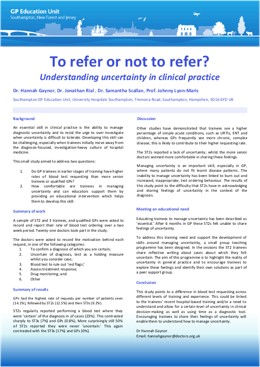Understanding Uncertainty
Dr Hannah Gaynor, Professor Johnny Lyon-Maris, Dr Jonathan Rial, Dr Samantha Scallan
Background
The ability to tolerate uncertainty allows a doctor to manage patients appropriately, and in so doing places their best interests at the heart of clinical practice. It is a particularly challenging area for educators to ‘teach,’ yet it is an educational imperative to equip future GPs with an ability to be self--‐aware of their consultation style and tolerances, and to feel able to express feelings around uncertainty.
Summary of Work
The aim of the study was to explore GP trainees’ comfort when managing uncertainty, and as an outcome to design an educational programme to support the development of this skill as a key part of the consultation. A sample ST2 and 3 trainees in practice and GP trainers, recorded their blood test requesting rate over two weeks. For each request the doctor recorded the motivation for making it in terms of the certainty of the diagnosis.
Findings
ST2s regularly reported performing a blood test where they were ‘certain’of the diagnosis: (23%) of cases; this contrasted sharply to ST3s (7%) and GPs (0.8%). More surprisingly still 50% of ST2s reported they were never ‘uncertain’. This again contrasted with the ST3s and GPs. Additional data indicated that the ST2s, even after six months in general practice, did not feel able to share feelings of uncertainty. Having identified this as an educational need, a programme promoting the ability to recognise and manage uncertainty has been developed and piloted to support ST2s.

Conferences
| Title | Type |
|---|---|
| DEMEC 2015 | Poster presentation |
| RCGP Conference 2014 | Poster presentation |
Related events, research and information
MRCGP
25 May 2016 – The MRCGP is required by GP Trainees to gain Certificate of Completion of Training in General Practice (CCT)....
ST3
23 March 2016 – ST3 Teaching Sessions The ST3 teaching course provides educational sessions for ST3 Trainees. It is based at...
Knows How, Shows How, Does? Assessing the Impact of Facilitated Small-Group Learning on GP Trainees’ Consultation Skills
17 August 2016 – Background Preparation for high stakes assessments such as the CSA (membership exam for the RCGP, UK) can lead...
Mind the Gap: Using EBL as a Platform for Transition in General Practice Training
17 August 2016 – Background General Practice (GP) trainees in their first two years of training attend monthly educational...
Having Problems?
23 March 2016 – Having Problems? Your first port of call if you are having difficulties should be your clinical or educational...
Practice Based Small Group Learning (PBSGL) - putting EBM into practice
2 March 2016 – What is PBSGL? Practice Based Small Group Learning (PBSGL) is an innovative form of Continuing Professional...
Tai Chi: For Building Resilience
11 January 2017 – Background In recent years, there has been much interest in how GPs can protect themselves in their everyday...
FY2 in GP Small Group
5 May 2016 – FY2 Small Group Educational Sessions This group provides the opportunity for F2 doctors on GP placement to...
Fostering Resilience with GPs: A Workshop Approach
16 August 2016 – Background In recent years, change within the NHS and to the way care is delivered has seen the intensity of...
